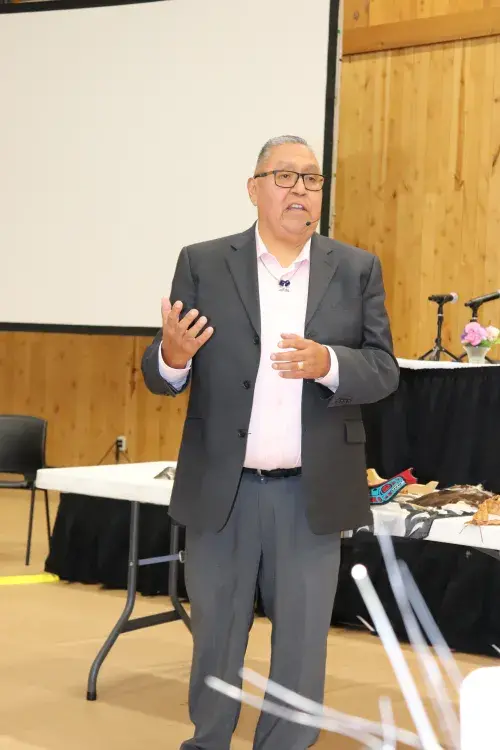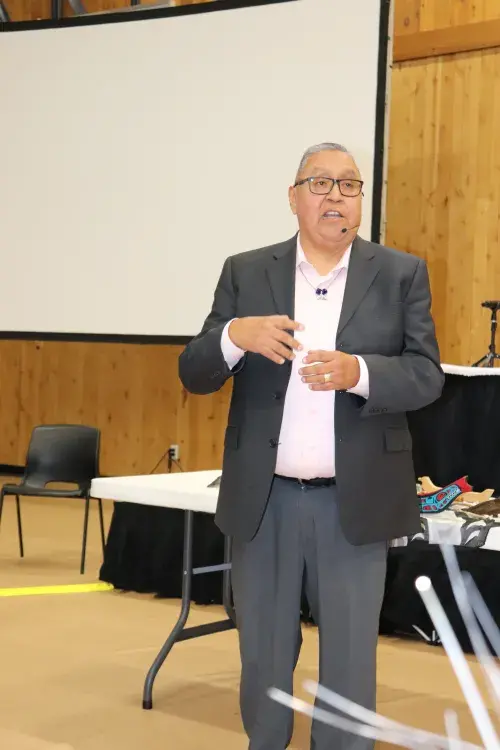“I’ve been through a lot of things and did a lot of healing,” says Stan Matthews, who has been working with Indigenous people in cultural healing for 36 years.
The Tla-o-qui-aht member shared his experiences during “Keep your mind wiikšaḥii (healthy), a cultural approach to loss”, a feature presentation that led day two of the DAC Health Ability Fair on Oct. 24 at the Alberni Athletic Hall.
The youngest of nine children, Matthews grew up in Nanaimo. His first, most profound experience of loss was when his father passed away when Mattews was only seven years old.
“I didn’t know what happened,” he said, adding that death was never explained to him.
He didn’t know what his mother meant when she told her young son that his father was gone.
At a very young age Matthews tasted alcohol. By the time he was 14 he was kicked out of school due to drinking. His mother told him if he wasn’t going to school, then he would have to work. So, he did. But that didn’t bring the results his mother had hoped for.
“Now I was making money, and guess what I spent that on?” he asked the crowd.
By the age of 25, Matthews became disenchanted with alcohol and drugs, but he needed help to break free of addiction. He reached out to Tillicum Haus, the Friendship Centre in Nanaimo, where he not only got clean, but also launched a career, helping others.
His first job in this role was at the Nuu-chah-nulth Tribal Council, where his mentor was the Ditidaht elder Charlie Thompson.
“We traveled to the Nuu-chah-nulth communities and knocked on doors. We learned our ways from our people,” he shared.
That was back in the late 1980s. Thirty-six years later, Matthews built on his skill set taking advanced training in the human services areas of addictions, trauma, family dynamics and abuse issues. He has also had training in hypnotherapy.
Hypnotherapy, or hypnosis, says Matthews, is simply focused attention and can be a tool to help people heal. It is reaching the subconscious part of the mind.
When you’re driving and drift off in your thoughts, and next thing you know you’re further down the road and don’t remember getting there – that’s focused attention, according to Matthews. He went on to explain that when you reach that part of your mind, you can reprogram thoughts, replacing negative ideas with positive ones.
Matthews says people can practice this with their toddlers. When they’ve fallen asleep, Matthews says you should lie next to them and, in a soft and gentle voice, fill them with positivity.
“Tell them how good they are, how smart they are, how well they will do in life,” he advised.
When it comes to death, Matthews said Indigenous people did things differently than how they are done today. Prior to western influence, he said, laying a person to rest was a small, immediate family event.
“The deceased person was brought inside the home through a window,” said Matthews.
He went on to say that the family would sit with their lost loved one for a period of time before the deceased was taken back out through the window and laid to rest, either in a cave or up a tree.
But then change came and people started having funerals.
“It became monetized,” said Matthews, adding that people now have to pay for caskets and services.
There were cultural, traditional ways to guide us through loss, said Matthews.
“We have cultural and traditional ways for just about everything,” he noted. “Honor the memory of those you’ve lost.”
He told people to think of the eagle when they’re feeling overwhelmed with grief.
“The eagle spreads its wings and allows the wind to carry it high above the storm,” he shared.
Mental fitness is important. It means keeping your mind challenged and engaged through activities like reading, doing puzzles, taking education programs.
“We keep our minds healthy by keeping it challenged,” said Matthews, adding that cultural things like singing, dancing, weaving and making art keep our minds healthy.
Spiritual self-care means having the ability to connect to something larger than ourselves. For some Nuu-chah-nulth people, that entity is Naas, the Creator.
Calming the mind is important. Having the ability to tune out the world and relax for a few minutes can help. Practicing yoga is one way to calm the mind and connect with self, said Matthews. Another way is to connect with elders.
“Sit with them, reignite that sense of connection,” said Matthews.
He warned that we can’t let social media take the place of in-person interaction.
“Our culture and tradition are not to keep things. We pass things on – we share,” said Matthews. “We have the tools – the medicine to reconnect spiritually, to cleanse. And if you don’t know how, you can learn.”


